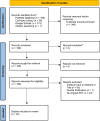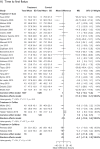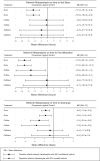Gum Chewing and Coffee Consumption but not Caffeine Intake Improve Bowel Function after Gastrointestinal Surgery: a Systematic Review and Network Meta-analysis
- PMID: 37277676
- PMCID: PMC10412511
- DOI: 10.1007/s11605-023-05702-z
Gum Chewing and Coffee Consumption but not Caffeine Intake Improve Bowel Function after Gastrointestinal Surgery: a Systematic Review and Network Meta-analysis
Abstract
Background: Postoperative ileus is common after gastrointestinal surgery. This network meta-analysis aimed to compare the effectiveness of gum chewing and coffee and caffeine intake on ileus-related outcomes.
Methods: A systematic literature review was performed to identify randomized controlled trials (RCTs) comparing noninvasive treatments for ileus after gastrointestinal surgery. The main analyses included random effects network meta-analyses using frequentist methods with simultaneous direct and indirect comparisons of time to first flatus, time to first defecation, and length of stay. Bayesian network meta-analysis using Markov chains was also used.
Results: A total of 32 RCTs comparing 4999 patients were included in this network meta-analysis. Time to flatus was reduced by gum chewing (mean difference compared to control (MD): -11 h, 95% confidence interval (95% CI) - 16 to - 5 h, P < 0.001). Time to defecation was reduced by gum chewing and coffee, with MDs of -18 h (95% CI - 23 to - 13 h, P < 0.001) and -13 h (95% CI - 24 to - 1 h, P < 0.001), respectively. Length of stay was reduced by coffee and gum chewing with MDs of - 1.5 days (95% CI: - 2.5 to - 0.6 days, P < 0.001) and - 0.9 days (95% CI: - 1.3 to - 0.4 days, P < 0.001), respectively.
Conclusion: Coffee and gum chewing were proven to be effective noninvasive approaches for shortening the postoperative length of hospital stay and time to first defecation, especially in open gastrointestinal surgery; thus these actions should be recommended after gastrointestinal surgery.
Keywords: Abdominal surgery; Bowel function; Bowel surgery; Caffeine; Coffee; Gastrointestinal surgery; Gum chewing; Network meta-analysis; Postoperative ileus; Systematic review.
© 2023. The Author(s).
Conflict of interest statement
The authors report no conflicts of interest. TS holds a grant from the “Stiftung Chirurgie,” St. Gallen, Switzerland, to financially support scientific publications in surgery.
Figures







Comment in
-
Commentary on: "Gum Chewing and Coffee Consumption But Not Caffeine Intake Improve Bowel Function After Gastrointestinal Surgery: a Systematic Review and Network Meta-analysis." J Gastrointest Surg. 2023 Jun 5. doi: 10.1007/s11605-023-05702-z.J Gastrointest Surg. 2023 Oct;27(10):2277-2278. doi: 10.1007/s11605-023-05810-w. Epub 2023 Aug 24. J Gastrointest Surg. 2023. PMID: 37620662 No abstract available.
References
Publication types
MeSH terms
Substances
LinkOut - more resources
Full Text Sources
Research Materials
Miscellaneous

